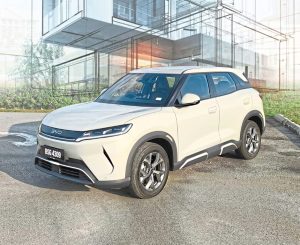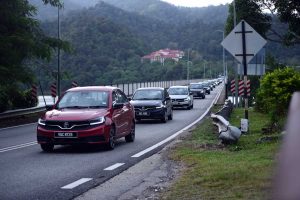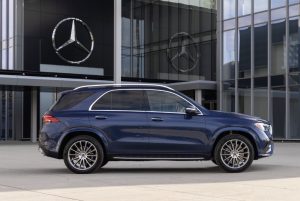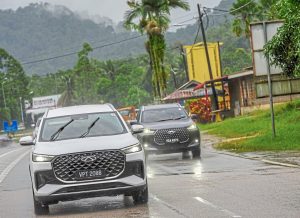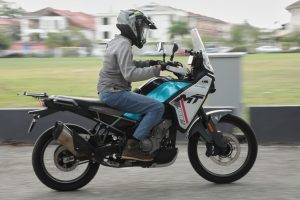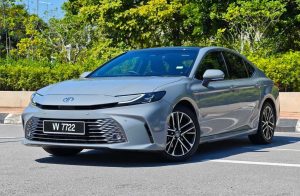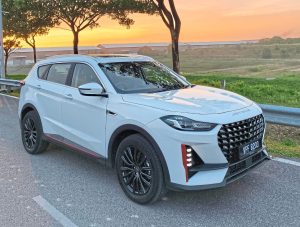PETALING JAYA: The all-electric Volvo EX30 is set to enter Malaysia next year ahead of the EX90 flagship SUV.
"We're really excited about this car. It's a chance to get new people into our brand and new people into electrification," said Volvo Car Malaysia (VCM) managing director Charles Frump.
The EX30, slotted below the XC40 and C40, will be priced accordingly to its position in the line-up.
As reference, the XC40 Recharge Pure Electric is selling for RM278,888 and the C40 is RM10,000 extra.
VCM declined to say whether the EX30 would be introduced as a locally assembled model at market launch.
"The specifics like the pricing and the manufacturing approach will come later," Frump said in a recent interview.

The EX30 interior.
Although the EX90 made its global debut last November followed by the EX30 earlier this month, production of the bigger SUV was held back by buggy software.
The Swedish carmaker said it needed more time for software development and testing, delaying its output to the first half of 2024 instead of the initial Q4 2023 period.
As for the EX30, Volvo CEO Jim Rowan had predicted that its smallest SUV is likely to be its bestseller, with a starting price of 36,000 euros (RM178,000) in Europe.
It also has the distinction of being Volvo's fastest-accelerating car ever. The all-wheel drive variant provides 315kW (428hp) and takes the EX30 from 0-100kph in 3.6 seconds!

Frump.
Sales of the electric XC40 and C40 have been growing strongly in Malaysia, said Frump, adding that 72% of cars sold last year were plug-in hybrid electric vehicles (PHEVs) and battery electric vehicles (BEVs).
"So that gives us a good sense of where the market is heading.
"In the last five years, we've tripled our volume. Looking back last year, we were up 43% by our count, we are the fastest growing luxury car company in Malaysia."
Meanwhile, waiting time for customers to get their cars have been shortened from the three to six months before, according to Frump.
"In the last two months now, almost all of our car lines are getting supply. So the waiting times have come down dramatically."
Home electrification
Contrary to the popular narrative that installing more public chargers would promote EV usage, Frump believes the better approach is to focus on home electrification — whether they be landed properties or apartments — and ensuring the power grid is able to support them.
"Home charging is really the key. If you charge at home, you're 99% there and the problem is some can't charge at home.
"If we can get the government concentrating on home electrification, that is really the key more than public infrastructure.
"Right now, we're providing a home charger for customers. So the dealer goes to their house to make sure that it has all the requisite needs for electricity, that it's safe, then the dealer installs it. And that's the typical case for both PHEVs and BEVs."
Range anxiety is also a hot topic that the VCM chief thinks has to be seen in the right context.

He said most people have pre-conceived notions on the matter, while having "very little experience driving electric cars."
"What I've noticed is this kind of universal worry around range. And it's not even range. It's the worry of running out of electric power and not being able to easily charge the car.
"They don't even know what they should be afraid of and what they should not be afraid of."
Frump, who has been driving the C40 for about a year, said he has no reason for range anxiety.
"For me, only two times have I, in the full year that I've been driving this, gone below 50% on my battery. Every time I have a charger right next to my car, every night I plug it in, every morning it's full. Typically, I go from 100% to 90, maybe 85, and never is it down even in that kind of dangerous zone you would think about.
"You'd be crazy not to think about electrics already, especially if you have charging at home. For a primary car, it can be a challenge and that's where plug-ins can play a big role."
Incidentally, the C40 range was rated at 450km (WLTP) but technical updates announced this year have bumped it up to 550km.

With Chinese car makers at the forefront of electrification and starting to make inroads into Malaysia, Frump welcomes their arrival, saying it would help push the industry towards EVs.
"Any adoption of electrics is good for us. This is where we're going. I think it's only natural that competitors are going to come in. Do we want to perform better than our competitors? Of course, we do.
"Some Chinese brands are not so active in the luxury space yet, but their pricing is getting fairly close to ours, which is interesting to see."
Frump said he is happy with Malaysian government tax policies to promote EVs with time extensions for tax exemption up to 2027 for locally assembled cars.
"For electrics, it has allowed us to set a long-term strategy here, and to say we can make the commitment on CKD (local assembly), we can make the commitment on volumes.
"That's a pretty good planning range for us. The longer the better, of course, but with the 2027 time extension, that's within our window of launching the EX30, the EX90 and more."

Although some car makers are exploring fuel cells, efuels and solar as alternative propulsion systems, Volvo is all in on BEVs.
"We are taking a very focused approach. We have to, we're one of the smaller companies out there. We have to make bets," said Frump.
"This is maybe our biggest call, but we've gone all in on electrics. This is how a small company can compete with big companies making calculated bets that are leaning in to mega trends. The mega trend is electric."
Locally, Volvo has had nine years of working with batteries and is confident that they would last many more years.
"Our resale value now on PHEVs is extremely good. The resale value is staying high, and performance of those batteries has been very good," said Frump.
For the BEVs which are a more recent product line, Volvo is injecting peace of mind with an eight-year warranty on the batteries.
Volvo is already in discussions to set up a regional battery refurbishment centre in Asia where ageing batteries would be given a second life.
"We've done this in Europe, we're looking at doing it in Asia. So these kind of things are coming," said Frump.

On lowering Volvo's carbon footprint, Frump said the biggest impact has been switching the product mix towards electric cars.
"We were the first to have a full line-up of plug-in hybrids built and exported from here in Shah Alam. We were also the first to have two full electric cars assembled locally," said Frump.
"Those cars are now being exported. So the more eco-friendly car line mix has made the biggest impact."
Frump said in closing that the safety, the "Swedishness" of Volvo cars and the brand's growing green credentials are attracting customers to its camp.
"In the past, maybe we haven't embraced that Swedish design culture as much as we should have."
He cited the previous XC90 as having changed the trajectory of Volvo as it refocused on its Swedish design, characterised by a minimal approach that seeks to combine functionality with beauty.

The EX90.


